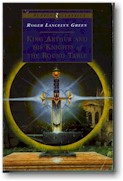BOOK #77
|
 |
Review
by Edward Tanguay January 6, 1997 |
But, behold now, on this the first day of the Round Table, I lay upon you all the Order of Chivalry. All of you, and those who shall sit afterwards at this Table, are the Knights of Logres, and for the glory of Logres, the Realm of Righteousness, do not ever depart from the high virtues of this realm. Do no outrage nor murder nor any cruel or wicked thing; fly from treason and all untruthfulness and dishonest dealing; give mercy unto those that seek it--or sit no more at this Table. And always give all the help in your power to ladies and damsels, go out to succour gentlewomen and widows, turn from all else to right any wrong done to any woman in the world--and never, on pain of death and eternal disgrace, do you any ill thing to a woman, or suffer it to be done. Nor, for love or gain, fight in any quarrel that is not just and righteous.
Although I did not really enjoy reading these stories (it was like watching Monty Python without the humor), I did appreciate finding the origin of many familiar stories and characters: the sword in the stone ("Whoso pulleth out this sword from this stone and anvil is the true-born king of all Britain"), Merlin, the Holy Grail "wherefrom our blessed Lord Jesus Christ drank the wine at the Last Supper", Guinevere, Sir Gawain and the Green Knight, Camelot.
The themes are classic: fate ("Nay, it is my fate. It is to the glory of Logres..."), courage ("If it were possible for me to die a hundred times, I would rather that."), chivalry ("...as a true knight should who speaks with the lady of his host."), magic healing, horses horses horses, armor armor armor, the Round Table, feasting, hosting, jousting, knights arriving with adventure ("King Arthur did not wait for an adventure to come before he began every feast, but none the less he was always happy if such a thing should happen"), swords, dying, rescuing women, beauty ("he beheld the loveliest maid that ever his eyes had seen"), pure and humble deeds, manly manliness ("Leave off looking at that lady--she's mine! And look at me instead--for I'm the last thing you shall see before you die!"), it all is so thick and heavy ("At least give me my sword, that I may die with it in my hand.")
My translation or rendition by Roger Lancelyn Green was a bit sober and burst only occasionally above the "this is what happened" drone:
Putting all his strength into the blow, Gawain whirled up the axe and struck so hard that the keen blade cut through flesh an bone and set the sparks flying from the stone paving, while the Green Knight's head leapt from his shoulders (!) and went rolling across the floor. But the knight neither faltered nor fell: swiftly he sprang forward with hands outstretched, caught up his head (!), and turning with it held in his hand by the hair mounted upon the waiting horse. Then, riding easily as if nothing had happened, he turned his face towards Gawain and said...
In fact, Sir Gawain and the Green Knight was my favorite tale, but it could be told much better than it was told here. I think this rendition was for kids under 10 or something, it was really simple.
The Guinevere-Launcelot love affair gave a nice twist to this series of chivalrous stories. I am sure many a Harlequin has spun off of this one ("Oh Launcelot, Launcelot, since the first day that you came to Camelot, when I was little more than a girl, the bride of King Arthur, I saw you and loved you."). It was one of the only constant themes in the particular collection of stories which I read.
Reading these stories made me think of the Arabian Night stories and the major cultural differences between them. You can say that these stories come from two completely different worlds. Nor do the King Arthur tales don't seem to have the deep saga of a German or Norse myth. Perhaps it was how they were related but it all seemed a bit light and dainty with no deep symbolism.
These stories show us a chivalrous culture in the midst of the dark-aged nonculture. The age of Arthur and the Knights of the Round Table where a little highlight in history, not as bright as the Greeks but a little puff of civilization in the midst of non-civilization, "that brief period of light set like a star of heaven in the midst of the Dark Ages, for very soon the saxons had conqured the whole of Britain and the Dark Ages descended upon all the western world."
Edward Tanguay
Send your review on this book to The Online
Reading Club.
Check out the books we are currently reading.
Go the the Online Reading Club Home Page.
